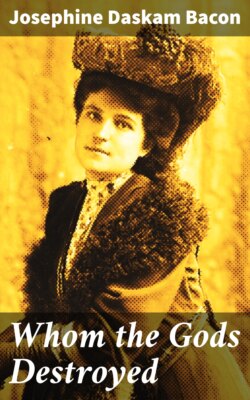Читать книгу Whom the Gods Destroyed - Josephine Daskam Bacon - Страница 3
На сайте Литреса книга снята с продажи.
I
ОглавлениеTable of Contents
The most high gods have decided that too much power over the hearts of men shall not be given to other men, for then the givers are forgotten in the gift and the smoke dies away from the altars. So they kill the men who play with souls. According to an ancient saying, before they destroy the victim they make him mad. There are, however, modifications of the process. Occasionally they make him drunk.
As I came down the board-walk that leads to the ocean, I saw by his staggering and swaying gait that the man was not only very drunk indeed, but that he gloried in the fact. This was shown by his brandishing arms and tossing head and the defiant air with which he regarded the cottages, before one of which he paused, leaned forward, placing one hand dramatically at his ear, and presently executed a wild dance of what was apparently derision. A timid woman would have retreated, but I am not timid, except when I am alone in the dark. Also I have what my brother-in-law calls Bohemian tastes. As nearly as I have been able to understand that phrase, it signifies a great interest in people, especially when they are at all odd. And this solitary, scornful dance of a ragged man before the Averys' cottage was odd in the extreme.
So I walked quietly along. When I reached the man I heard him muttering rapidly to himself, while he rested from the exertion of his late performance. What did dancing drunken men talk about? I walked slower. My brother-in-law says that a woman with any respect for the proprieties, to say nothing of the conventions, would never have done this. I have observed, however, that his feelings for the proprieties and the conventions, both of them, have on occasion suffered relapse, more especially at those times, prior to his marriage to my sister, when I, although supposed to be walking and riding and rowing and naphtha-launching with them, was frequently and inexcusably absent. So I gather that the proprieties and the conventions, like many other things, are relative.
As I passed the man he turned and looked crossly at me and spoke apparently to some one far away behind me, for he spoke with much force.
"Did you ever hear such damn foolishness?" he demanded. Now there was nothing to hear but Miss Kitty Avery playing Chopin's Fourth Ballade in F minor. She played it badly, of course, but nobody who knew Kitty Avery would have imagined that she would play otherwise than badly, and I have heard so much bad playing that I didn't notice it very much anyway. I thought it hardly probable that the man should know how unfortunate Kitty's method and selection were, so I passed directly by. Soon I heard his steps, and I knew he was coming after me. While he was yet some distance behind me he spoke again.
"I suppose that fool of a woman thinks she can play," he growled as he lurched against a lamp-post. Then I did the unpardonable deed. I turned and answered him.
"How do you know it's a woman?" I asked.
"Huh! Take me for a fool, don't you?" he said scornfully, scuffling along unsteadily. "I'm drunk as an owl, but I'm no fool! No. I know it's a woman from the pawin' 'round she does. Bah! Thinks she's playin'. Damn nonsense!" He sat down carefully on the sand by the side of the walk and wagged his head knowingly. I looked cautiously about. No one was in sight. I bent down and untied my shoe.
"Perhaps you could play it better?" I suggested sweetly. His jaw dropped with consternation.
"Play it better! Oh, Lord! She says can I play it better! Can-I-play-it-better? Well, I'll tell you one thing. If I couldn't play it better, d'ye know what I'd do? Do you?"
"No," said I, and tied my shoe. He didn't talk thickly as they do in books. On the contrary, he brought out each word with a particularly clear and final utterance.
"Well, I'll tell you what I'd do. I'd go off and drown my sorrers in drink! Yes, I would. Although I'm so drunk that I wouldn't know when I was getting drunk on principle and when I was just plain drunk. Le' me tell you somethin': I'm drunk now!" He announced the fact with a gravity so colossal as to render laughter impossible. I untied the other shoe.
"Can you really play Chopin?" I said. He shook his fist at the Avery cottage.
"What I can't play of Chopin you never heard played! So that's the end o' that," he said. The folly of the situation suddenly became clear to me. I hastily tied my shoe and turned to go. He half rose from the sand, but sank helplessly back.
"Look here," he said confidentially, "I'm tired, and I need m' rest. I got to have rest. We all need rest. If you want to hear me play, you come to the old hulk of a barn that's got the piano in it. They call it the auditorium—au-di-to-ri-um." He pronounced the syllables as if to a child of three. "I'll be there. You come before supper. I'll be rested then. I'd like to shoot that woman—thinks she can play—damn nonsense—" I went on to the beach.
